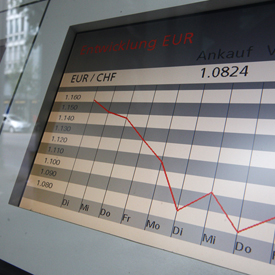Banking regulation under new scrutiny after UBS loss
After UBS failed to pick up the unauthorised loss of £1.3bn, regulation of the industry and exchange traded funds (ETFs) in particular, are coming in for fresh criticism.
The loss of £1.3bn is a huge blow to the Swiss banking giant, which was already suffering in the global market. Oswald Gruebel, UBS chief executive called the loss “distressing” and said he “will spare no effort to establish how it happened”.
But as details of the unauthorised loss were reported, it emerged that the bank’s monitoring system failed to pick up the fraud. It was an alleged rogue trader who disclosed the loss to UBS and effectively, handed himself in.
Even if companies are good at looking at process, they are failing to assess behaviour, said John Abbott, head of corporate risk management at RSM Tenon told Channel 4 News.
“No matter how comprehensive your contingency plans are, how large your audit department is or how clearly you have communicated your policies, someone smart and determined can always find a way to cheat the system,” he said.
“Companies need to get better at identifying the behaviour common to rogue and criminal employees, not solely give them further processes and policies to dance around.”

ETFs under the spotlight
The £1.3 billion fraud has also brought ETFs, or tradable investment funds, into the spotlight again, as the trader alleged to be responsible for the incident was the director of UBS’s Delta One trading team, which works with ETFs.
The ETF industry has yet to comment on the role the system may have played in the huge unauthorised loss for UBS, saying that there is not yet enough information about the incident.
But the Bank of England and the Financial Services Authority have previously expressed concern about the way ETFs operate.
The risks that are being incurred in running, constructing, trading and holding ETFs are not sufficiently understood. Terry Smith, Tullett Prebon
Today, Terry Smith, chief executive of money brokers Tullett Prebon said he had thought for a long time that ETFs were being mis-sold to the retail market.
The incident at UBS has highlighted the lack of risk controls by banks that are dealing “in opaque instruments” as well as “the need to separate investment and retail banking and the risks inherent in ETFs,” he said.
In a blog post this morning entitled “ETFs – you were warned”, Mr Smith said that ETFs should no longer be regarded by investors as the same as index funds.
“They are “synthetic” and hold derivatives,” he wrote. “What if (when?) such ETF trades cause such a mammoth loss in a counterparty which does not have sufficient capital to bear the loss and pay out under the derivative contract? Answer – the ETF will fail.
“The risks that are being incurred in running, constructing, trading and holding them are not sufficiently understood. After the UBS incident I think this should be regarded as indisputable.”